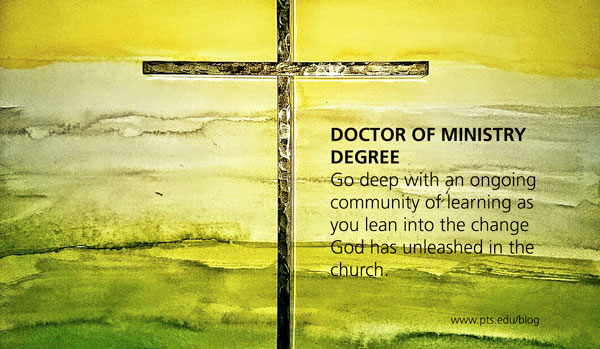Many pastors sense that the church they were trained to serve and the church they encounter each day are two different universes. Things change. Change is part of life. Yet change in the church over the last two decades has been phenomenal. Even disorienting.
Some of us adapt to change easily. For others, it’s really difficult. For all of us, leaning into change is easier when we do it intentionally: in the midst of community and conversation.
That’s the main reason to get a doctor of ministry (DMin) degree: to gather and go deep with an ongoing community of learning as you lean into the change God has unleashed in the church. It’s an exciting time to be in ministry. It’s also daunting.
Why get a doctor of ministry degree?
In many ways, entering a DMin program is like returning to the well that first cooled your thirst. It’s an opportunity to drink from the living water that fed your venture into ministry. In this return to the water though, you know much more about the terrain you seek to cover: the wilderness, the parched earth, the verdant valleys. The possibilities, the hope, the drudgery, and the despair that are part and parcel of every pastor’s life.
Our professors love to teach in the DMin program precisely because the students come back to the well with this new knowledge and new awareness. They bring living questions and stark realities from daily service in complex congregations and creative ministries around the country. Professors in the DMin program learn from their students as much as the students learn from them. The banquet they serve to pastors in training at the master’s level is lent new flavors and remade by what they learn about ministry from students in the DMin. It is an exciting exchange!
DMin Education
Knowledge is wonderful in many different forms. In many ways, DMin education moves in the opposite direction of master’s-level education. Abstract ideas can be tantalizing and fun. Broad visions and passionate hope born of deep study has the capacity to energize us for new horizons. What is wonderful about the DMin though, is that you start with the concrete. Your context. Your questions. You bring the dailiness of ministry back to the well you first drank from, seeking with new urgency living water for the place, moment, people, and challenges in which you dwell.
You also form relationships. Deep, collegial relationships born of studying, learning, and exploring together. In our DMin program we place a huge emphasis on this ongoing learning in community. Every DMin cohort is led by a faculty mentor who serves as a guide and advisor. In addition, a cohort facilitator serves as a pastor to the pastors: leading group formation; planning times for worship and sharing; connecting the group between course weeks so that the learning and bonding continues even when the group has dispersed back to the work of daily ministry.
Why get a DMin? Because your journey of growth and learning is not over when you leave seminary and venture into the world of ministry. In fact, it is just beginning. A DMin is a return to the banquet that first fed you. A return that helps you continue to feed others in the call God has set before you.
The Rev. Dr. Denise Thorpe previously served as Pittsburgh Seminary’s interim director of the Doctor of Ministry Program. New cohorts typically begin in January and June each year and focus on a number of topics including Christian spirituality, parish ministry, missional leadership, creative writing and public theology, and intergenerational Black church studies. Financial aid may be available for those who qualify. Learn more about the Doctor of Ministry Program at Pittsburgh Seminary.

